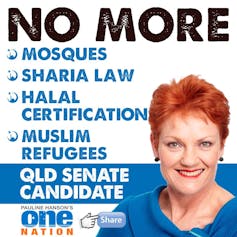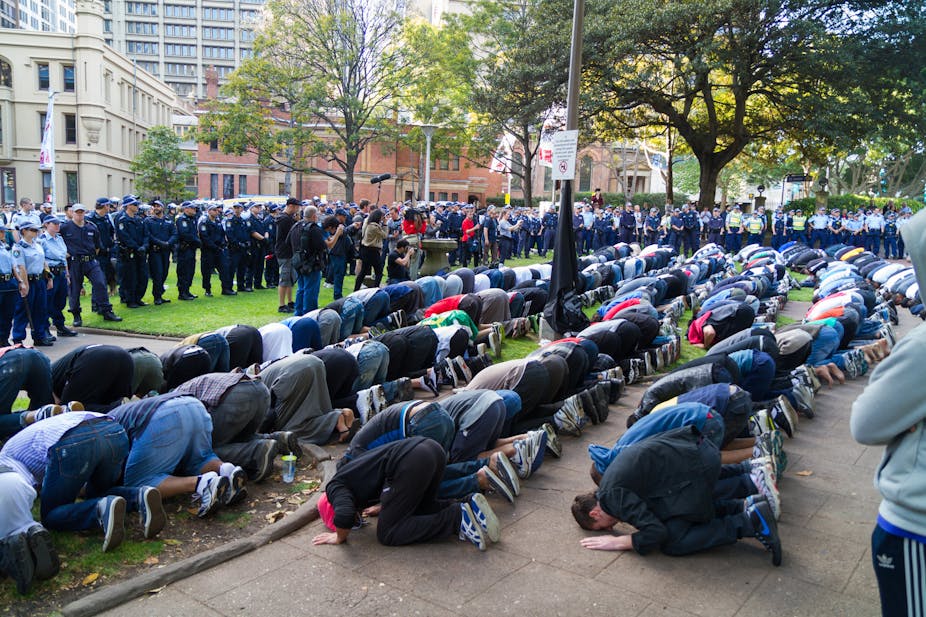This article is part of the Democracy Futures series, a joint global initiative with the Sydney Democracy Network. The project aims to stimulate fresh thinking about the many challenges facing democracies in the 21st century.
Across the Western world we have seen the rise of right-wing populists such as Donald Trump in the US, Geert Wilders in the Netherlands and Marine Le Pen in France. They have seized on Western fears of Islamic invasion and translated them into votes.
The political resurrection of Pauline Hanson and the appearance of a poll indicating that 49% of Australians wish to stop Muslim immigration suggest right-wing populism has found fertile ground in Australia.
The rise of the populist right tends to be rationalised as either the resurgent racism of white people, manifesting as Islamophobia, or as a protest vote against the negative effects of globalisation.
But behind the rise of anti-Muslim antipathy in Australia lies a more uncomfortable explanation: the surprising persistence of religious identity in Australian public life.
Hanson’s racism cannot be downplayed. Nor should the possibility that many Australians voted for One Nation as a protest against the major parties be discounted. Still, racist attitudes and economic factors alone cannot explain the nearly 600,000 votes One Nation’s Senate candidates received at the last federal election.
One Nation’s arguments against multiculturalism and immigration – like those of similar right-wing populist parties around the world – do not preclude the idea that people of different ethnicities can live together. Rather, they tout a vision of Western civilisation that is founded upon Judeo-Christian values and under siege by the alien force of Islam.
Linking Christianity to a secular society
One glance at the One Nation website reveals how important Christianity has become to the party’s understanding of Australian identity. The One Nation page on Islam begins:
Australia is a country built on Christian values. Our laws, way of life and customs enforced in the Australian Constitution were based on a secular society. Secularism is asserting the right to be free from religious rule and teachings or, in a state declared to be neutral on matters of belief, from the imposition by government or religion or religious practices upon the people.
Secularism has often been understood as the overcoming of religious belief. However, One Nation describes Australian culture as both Christian and secular. The implication is that secularism itself has come out of Christian values, so the two are entirely compatible.
For One Nation, Islam is the polar opposite of Christianity and secularism. Where Christianity allows a separation of church and state, Islam, according to One Nation, is inextricably political.
In her maiden speech to the Senate this year, Hanson remarked:
Islam does not believe in democracy, freedom of speech, freedom of the press, or freedom of assembly. It does not separate religion and politics. It is partly a religion, but it is much more than that. It has a political agenda that goes far outside the realm of religion.
Contrast this language to Hanson’s 1996 maiden speech. Back then, her primary concern was that white Australians would be “swamped” by Asian immigrants.
Today, Hanson seldom speaks about the threat of Asian immigration. Rather, when warning of the dangers of mass immigration to Australia, she no longer sees the threat as coming from particular ethnic groups, but from the cultures that certain migrants – especially Muslims – carry with them.
The religionising of politics
Western Europe, where right-wing populism has flourished over the past decade, has seen a similar religionising of politics.
German philosopher Jürgen Habermas has noted the return of religion in European public life. He argues that Europe has undergone a “change in consciousness” about religion. According to Habermas, this change largely came about due to Muslim immigration.
Two decades ago it was possible for Europeans to believe secular culture would triumph over religion the world over. Yet the increasing presence of Muslims in Europe, who continue to practise their faith despite the seemingly overwhelming forces of secular modernity around them, has forced Europeans to confront the reality that not all communities are happy to privatise their religious beliefs and adopt secular culture as their own.
Secular culture, then, suddenly seems far less universal and natural, and more like a particular product of the religion that gave it shape: Christianity.
European Muslims’ preference – especially since 1989’s Rushdie incident – for religious identification rather than ethnic identification has also played a powerful role in making Europeans rethink their own religious identity. As Habermas points out, having a Muslim neighbour makes a Christian European feel more – and identify more readily – as Christian.

In theory, a Muslim neighbour ought to make a non-religious person more likely to identity as non-religious. But in a society where secularism is increasingly linked to Christianity, many irreligious Europeans appear to be reacting to their new Muslim neighbours by identifying Western culture as “Judeo-Christian and Humanist”, as Wilders, leader of the Dutch Party For Freedom, puts it.
The populist right has seized on this new identity. By arguing that Muslims threaten the West’s Judeo-Christian and secular culture, it has propelled itself into positions of power in a number of countries, including Australia, France and the Netherlands.
Like its European peers, One Nation has reacted to the growing presence of Islam in Australia by emphasising Western civilisation’s Judeo-Christian and secular identity, and by demonising Muslims as belonging to a religion incompatible with secularism.
Attacking One Nation on the grounds that it is racist will do little to stymie its growth. This is because the party is beholden not merely to a racial conception of Australia as a “white” nation, but to an understanding of Western culture as both Christian and secular.

